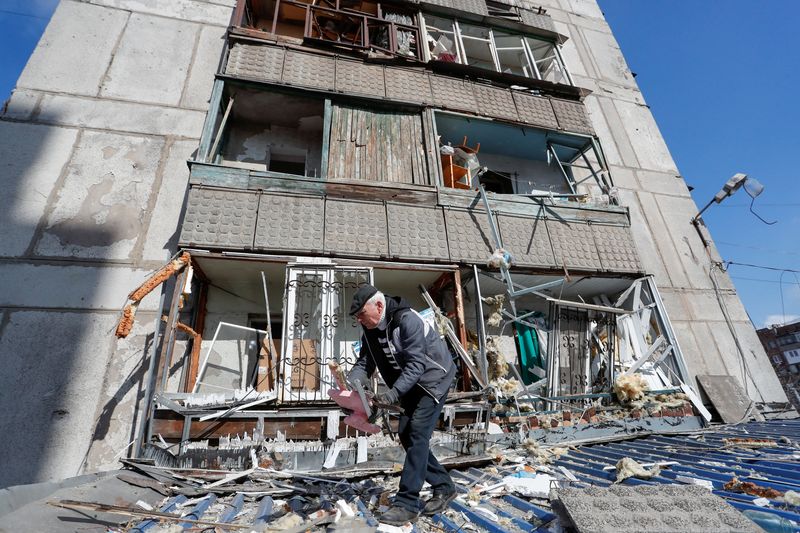By Andrea Shalal
WASHINGTON (Reuters) - Russia's invasion of Ukraine will affect the entire global economy by slowing growth and jacking up inflation, and could fundamentally reshape the global economic order in the longer term, the International Monetary Fund (IMF) said on Tuesday.
Beyond the human suffering and historic refugee flows, the war is boosting prices for food and energy, fuelling inflation and eroding the value of incomes, while disrupting trade, supply chains and remittances in countries neighbouring Ukraine, the IMF said in a post on its website.
It is also eroding business confidence and triggering uncertainty among investors that will depress asset prices, tighten financial conditions and could trigger capital outflows from emerging markets, it said.
"The conflict is a major blow to the global economy that will hurt growth and raise prices," the IMF said.
IMF officials has already said they expect to lower the Fund's previous forecast for 4.4% global economic growth in 2022. In Tuesday's post, they suggested their regional growth forecasts would also be likely be revised downward.
The IMF is due to release updated forecasts on April 19.
Countries with direct trade, tourism, and financial exposures would feel mounting pressure, the IMF said, citing a greater risk of unrest in some regions, from Sub-Saharan Africa and Latin America to the Caucasus and Central Asia.
At the same time, food insecurity was likely to further increase in parts of Africa and the Middle East, where countries like Egypt import 80% of their wheat from Russia and Ukraine.
In the longer term, it said, "the war may fundamentally alter the global economic and geopolitical order should energy trade shift, supply chains reconfigure, payment networks fragment, and countries rethink reserve currency holdings."
The IMF predicted deep recessions in Ukraine and Russia, and said Europe could see disruptions in natural gas imports and wider supply-chain disruptions. Eastern Europe, which has absorbed most of the 3 million people who have fled Ukraine, would see higher financing costs as a result.
The IMF said countries in the Caucasus and Central Asia with close trade and payment system links to Russia would be more affected by its recession and sanctions imposed since the invasion of Ukraine, curbing trade, remittances, investment and tourism. Moscow calls its actions in Ukraine a "special operation".
In the Middle East and Africa, worsening external financing conditions may spur capital outflows and add to growth headwinds for countries with elevated debt levels and large financing needs, the IMF said.
Higher energy and food prices, reduced tourism and problems accessing international capital markets would threaten countries in sub-Saharan Africa, which imports around 85% of its wheat supplies, with a third coming from Russia or Ukraine.

Food and energy prices are the main channel for spillovers in the Western Hemisphere, with high commodity prices likely to significantly quicken already high inflation rates in Latin America, the Caribbean and the United States.
In Asia, the biggest impact will be felt among oil importers of ASEAN economies, India, and frontier economies including some Pacific Islands, while new fuel subsidies could ease the impacts in Japan and Korea, the IMF said.